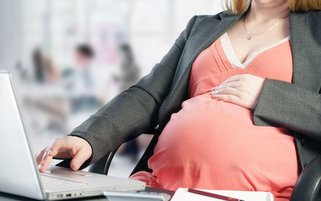A new bill could prevent employers from sacking women during pregnancy or in the six months afterwards.
Chair of the Women and Equalities Committee Maria Miller, who introduced the bill, has urged for stronger protection for pregnant women and new mothers, claiming that current provisions are “too often ignored or circumvented by employers”.

Lack of progress
In 2016, the previous Committee issued a report in which it demanded that the government take urgent action against the stark increase in workplace pregnancy discrimination over the past decade. It called for the UK to follow the example set by Germany, where pregnant women cannot be made redundant without the approval of a specific public authority.
In the report, the Committee asked for the government to provide a detailed plan to reduce the risk of more women being forced out of work. It proposed to revise health and safety practices, increase protections for casual, agency and zero-hours workers, and tackle discriminatory redundancies.
However, former cabinet minister Maria Miller MP, who is Chair of the Committee, has recently spoken out against the lack of progress made in this regard.
“Neither new parents nor the economy can afford to wait any longer”
At present, employers have to follow due process if they seek to make an employee redundant during pregnancy or maternity. For example, under current rules, employers who want to make a woman on maternity leave redundant must offer them a “suitable” vacancy where one is available.
Miller has called for a wider ban on making redundancies in order to “take the onus off women”.
The Pregnancy and Maternity (Redundancy Protection) Bill seeks to prohibit redundancy during pregnancy and maternity leave and for six months after the end of the pregnancy or leave except from in specified circumstances.
Speaking in the Commons, Miller warned the government that: “Family life and the economy will both suffer unless workplace practices are brought into the 21st Century” and has advised that “providing effective protection against redundancy for pregnant women would be a really good start.”
Discrimination against working mothers “unacceptable”
The bill comes after research by Department for Business Energy and Industrial Strategy (BEIS), which revealed that one in nine women had either been fired, made redundant or felt forced out of their job upon returning to work after having a child. Alarmingly, the study suggested that 54,000 women may lose their jobs due to pregnancy or maternity each year.
Free guide to Maternity Leave and Pay
Discover how to handle issues related to maternity leave
The Equality Act 2010 makes it illegal for employers to discriminate against a worker or job applicant, either directly or indirectly, on the basis of any “protected characteristics”. These are:
- Age;
- Disability;
- Gender reassignment;
- Race;
- Religion or belief;
- Sex;
- Sexual orientation;
- Marriage and civil partnership; and
- Pregnancy and maternity.
However, despite pregnancy and maternity discrimination being illegal, Business Minister Kelly Tolhurst maintains that “some new mothers still find unacceptable attitudes on their return to work, which effectively forces them out of their jobs.”
Theresa May has also spoken on the issue, saying that it is “unacceptable that too many parents still encounter difficulties when returning to work.”
While the bill has cross-party support, the likelihood of a 10-minute bill becoming statute is low without government backing. In reality, it is a long way off as a potential change; however, the ramifications for employers and women in the workforce would be huge.





